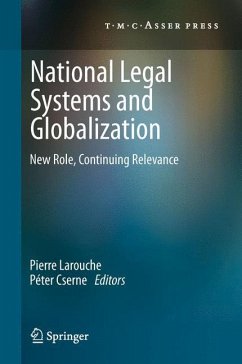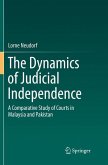For the researchers involved in this book, the prospects of national law seemed less dire than is usually acknowledged. The project team shows that globalization, instead of threatening national legal systems, puts them in a new role and gives them continuing relevance. First of all, once one takes a more functional view of the law, based on law and economics and comparative law literature, harmonization or unification of national legal systems is no longer a foregone conclusion. Secondly, fundamental constitutional principles continue to bear in the era of multi-level and transnational governance: they become governance principles, divorced from specific institutional settings. Finally, looking beyond regulatory competition and comparative law, legal emulation provides a rich and fruitful model to explain the interplay between legal systems. This book explores these three themes, both at a theoretical level and in the light of specific examples. It sheds a new light on the fate of national legal systems, with a more optimistic outlook. Researchers and practitioners alike will experience how this research project brings us a step forward in the understanding of the evolution of national legal systems in the globalization era.
The research for this book, in which a team of experts in comparative law and law and economics took part, was commissioned and funded by HiiL.
Pierre Larouche is Professor of competition law, Tilburg University (the Netherlands) and a founding director of the Tilburg Law and Economics Center (TILEC). Péter Cserne is now Senior lecturer in law, University of Hull (United Kingdom) and an extramural fellow of TILEC.
The research for this book was carried out at the Tilburg Law and Economics Center (TILEC) of Tilburg University (the Netherlands) under the direction of Pierre Larouche. It is the outcome of a research project of HiiL, entitled Convergence and divergence of national legal systems: coping with the challenges of globalization.
HiiL is an independent research and advisory institute devoted to promoting a deeper understanding and more transparent and effective implementation of justice and the rule of law, worldwide. It pursues this mission in several ways. First, it conducts both fundamental research and empirical evidence-based research. Second, it serves as a knowledge and networking hub for organizations and individuals in both the public and the private sector. And third, it facilitates experimentation and the development of innovative solutions for improving legal systems and resolving conflicts at any level. HiiL aims to achieve solutions that all participants in the process perceive as just. In line with its evidence-based approach, HiiL is non-judgemental with regard to the legal systems it studies.
www.hiil.org
The research for this book, in which a team of experts in comparative law and law and economics took part, was commissioned and funded by HiiL.
Pierre Larouche is Professor of competition law, Tilburg University (the Netherlands) and a founding director of the Tilburg Law and Economics Center (TILEC). Péter Cserne is now Senior lecturer in law, University of Hull (United Kingdom) and an extramural fellow of TILEC.
The research for this book was carried out at the Tilburg Law and Economics Center (TILEC) of Tilburg University (the Netherlands) under the direction of Pierre Larouche. It is the outcome of a research project of HiiL, entitled Convergence and divergence of national legal systems: coping with the challenges of globalization.
HiiL is an independent research and advisory institute devoted to promoting a deeper understanding and more transparent and effective implementation of justice and the rule of law, worldwide. It pursues this mission in several ways. First, it conducts both fundamental research and empirical evidence-based research. Second, it serves as a knowledge and networking hub for organizations and individuals in both the public and the private sector. And third, it facilitates experimentation and the development of innovative solutions for improving legal systems and resolving conflicts at any level. HiiL aims to achieve solutions that all participants in the process perceive as just. In line with its evidence-based approach, HiiL is non-judgemental with regard to the legal systems it studies.
www.hiil.org









